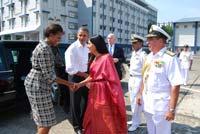Obama looks for economic opportunites in India, Asia

By Mike McCarthy
US President Barack Obama’s visit to India on the first stop of his Asia tour underscored the added importance of the relationship between the two countries at a time when the struggling US economy is looking for opportunities to grow. In India, the US decided to strengthen its strategic partnership and pledged to combat global terrorism.
Obama and Premier Manmohan Singh held talks on bilateral trade, regional security and UN reforms, in a US effort to boost ties with the South Asian country.
‘Given India’s growing role on the world stage, we’ll expand our dialogue on global issues,’ Obama said in New Delhi.
Obama called it one of the defining partnerships of the century, and referred to India as a ‘world power.’
‘We have decided to accelerate the deepening of our ties and to work as equal partners in a strategic relationship that will positively and decisively influence world peace, stability and progress,’ Singh said.
Singh said the two countries had agreed to broaden the strategic dialogue and cover other regions and areas as well as initiate joint projects in Africa and Afghanistan.
The US Department of Homeland Security and India’s Ministry of Home Affairs would collaborate to improve security at seaports, airports and borders, officials said.
The US also agreed to lift restrictions on high-technology exports to India and support New Delhi’s membership in non-proliferation organizations like the Nuclear Suppliers’ Group.
Initiatives on clean energy, health and agriculture were also announced.
Obama met government and opposition leaders, and address the parliament on Monday evening to elaborate Washington’s stand on India’s aspirations for a permanent seat on an expanded UN Security Council.
He left for Indonesia Tuesday on the next leg of his four-nation Asia tour, which will also take him to South Korea and Japan
Obama will be looking for ways to tap into Indonesia’s economic potential while reaching out to the world’s most-populous Muslim nation, aides said. Obama has a special relationship with Indonesia as he spent part of his childhood there, but cancelled two previously planned trips to focus on a crucial health care bill and April’s oil spill in the Gulf of Mexico.
In South Korea he will attend the G20 summit of the emerging and industrial economies ahead of joining the Asia-Pacific Economic Cooperation summit in Japan.
India’s 1.2 billion people and an economy expected to grow at eight per cent over the next several years makes it ‘a potentially very important market for US exports,’ said Mike Froman, a senior White House advisor for global economic affairs.
US exports of goods to India have quadrupled over the last seven years to 17 billion dollars annually, while service oriented exports have tripled to 10 billion dollars per year, Froman said. Indian companies are the second fastest growing foreign investors in the United States and support about 57,000 US jobs, he added.
India emerged as a cornerstone of US foreign policy in South Asia in the early 2000s, as then-president George W Bush’s administration cast aside decades of frosty Cold War relations to pursue closer ties with the world’s most-populous democracy, in part to help counter China’s burgeoning influence on the continent.
Central to the new relationship was a nuclear cooperation agreement that was finalized shortly before Bush left office and after years of negotiations complicated by India’s refusal to join the nuclear Non-Proliferation Treaty. The deal allows US firms to participate in the lucrative development of Indian nuclear energy to help it meet its growing thirst for electricity.









